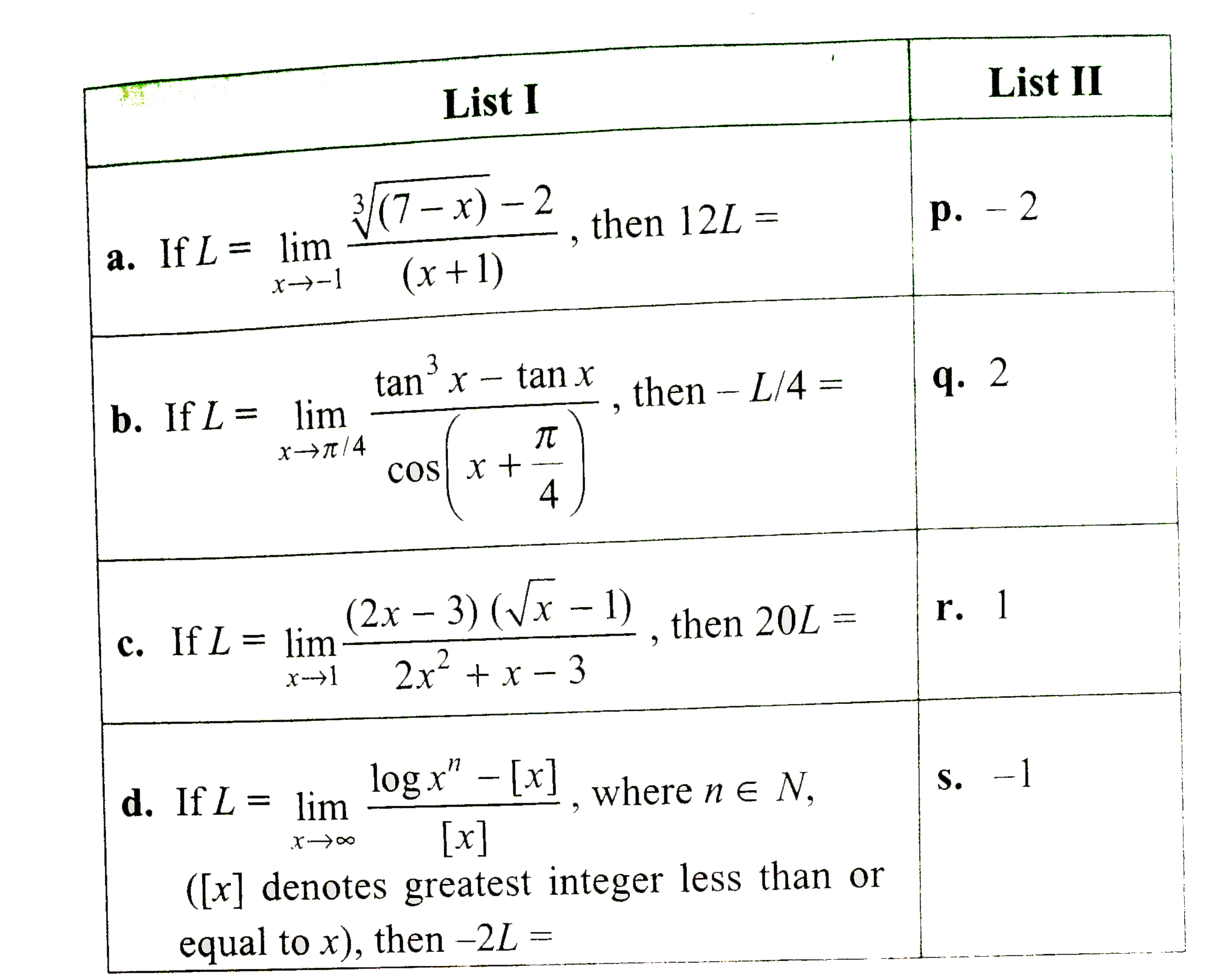limx→1(1−x)(1−x2)...(1−x2n){(1−x)(1−x2)...(1−xn)}2,n in N,equalsSolution in Bengali
0
2nCn
2n!
none of these
The correct Answer is:B
limx→1(1−x)(1−x2)...(1−x2n){(1−x)(1−x2)...(1−xn)}2
=limx→1(1−x1−x)(1−x21−x)...(1−x2n1−x)((1−x1−x)(1−x21−x)...(1−xn1−x))2
=1×2×3...(2n)(1×2×3...n)2=(2n)!n!n!=2nCn
Topper's Solved these Questions
- LIMITSBOOK - CENGAGE PUBLICATIONCHAPTER - LIMITSEXERCISE - Linked Comprehension Type
20 Videos
- LIMITSBOOK - CENGAGE PUBLICATIONCHAPTER - LIMITSEXERCISE - Matrix Match Type
5 Videos
- LIMITSBOOK - CENGAGE PUBLICATIONCHAPTER - LIMITSEXERCISE - EXERCISE 2.8
8 Videos
- JEE 2019BOOK - CENGAGE PUBLICATIONCHAPTER - JEE 2019EXERCISE - Chapter 10
8 Videos
- LINEAR COMBINATION OF VECTORS, DEPENDENT AND INDEPENDENT VECTORSBOOK - CENGAGE PUBLICATIONCHAPTER - LINEAR COMBINATION OF VECTORS, DEPENDENT AND INDEPENDENT VECTORSEXERCISE - DPP 1.2
10 Videos
Similar Questions
Letf(x)=sin−1(1−{x})×cos−1(1−{x})√2{x}×(1−{x}), where {x} denotes the fractional part of x.
L=limx→0−f(x) is equal to
View SolutionMatch the following lists:

View SolutionEvaluate limx→1cosπ2x1−√x
View SolutionIf y = y(x) is the solution of the differential equation, xdydx+2y=x2 satisfying y(1) = 1, then y(12) is equal to
View SolutionThe number of integral values of p for which (p+1)ˆi−3ˆj+pˆk,pˆi+(p+1)ˆj−3ˆk and −3ˆi+pˆj+(p+1)ˆk are linearly dependent vectors is q
View Solutionlim_ (x rarr1) (lim_ (n rarr oo) [n ^ (2) (x ^ ((1) / (n)) - x ^ ((1) / (n + 1))) / (x ^ ( 3) -1)])
View Solution(lim)x→1(1−x)(1−x2)(1−x2n){(1−x)(1−x2)(1−xn)}2,n∈N,equals ^2nPn (b) ^2nCn (c) (2n)! (d) none of these
View Solutionlim_(x rarr1)((1-x)(1-x^(2))............(1-x^(2n)))/({(1-x)(1-x^(2)).........(1-x^(n))}^(2))
View Solutionlim_ (x rarr oo) ((1 ^ ((1) / (x)) + 2 ^ ((1) / (x)) + 3 ^ ((1) / (x)) ++ n ^ ((1 ) / (x))) / (n)) ^ (nx), n in N
View SolutionShow that 1x+1+2x2+1+4x4+1+…..+2nx2n+1=1x−1−2n+1x2n+1−1
View Solutionlimx→1x+x4+x9+……….+xn2−nx−1 is
View Solutionlimx→∞n+12n2+n−1
View SolutionIf limx→1x1+x2+x3+...+xn−nx−1=820,(n∈N)
then the value of n is equal to
View Solutionlimx→1(1−x)(1−x2)...(1−x2n){(1−x)(1−x2)...(1−xn)}2,ninN," equals"
View Solution∫ex(1+n.xn−1−x2n)(1−xn)1−x2ndx बराबर है-
View Solution
